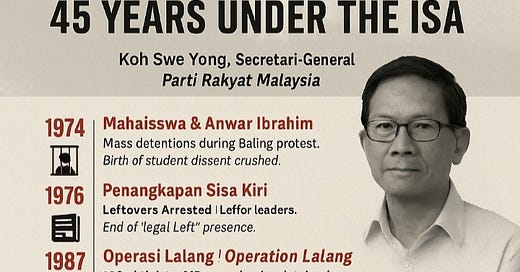How the ISA Crushed Malaysia’s Left – A History We Shouldn’t Forget
by Koh Swe Yong, Secretary-General, Parti Rakyat Malaysia (PRM)
For 45 years, the Internal Security Act (ISA) cast a long shadow over Malaysian politics. Enacted in 1960 and repealed only in 2012, the ISA was often defended as a tool to preserve national security. In practice, it served another purpose: the systematic dismantling of Malaysia’s Left.
Today, few remember that in the decades following independence, leftist and socialist movements had real momentum. Parties like Parti Rakyat, Parti Buruh, and the Socialist Front once spoke boldly for workers, farmers, and students. They envisioned a multiracial, egalitarian Malaysia—long before such ideas became acceptable in the mainstream.
But this vision was short-lived. The ISA, with its power to detain without trial, became the key instrument used to erode that progressive movement from within.
A Legacy of Suppression
The first major blow came in the 1960s. As the Socialist Front gained popularity and won seats in local councils, its leaders were detained en masse under the ISA. Their crime? Opposing communal politics and speaking up for the poor.
Then came May 13, 1969, and the rise of the National Operations Council. In the name of “restoring order,” the state expanded its powers. Once again, the ISA was deployed — not only against those inciting racial hatred, but also against leftists who dared question government policy, the New Economic Policy, or the shrinking space for democratic dissent.
One of the most pivotal moments was the Baling student protest in 1974. University students stood with rural farmers struggling with poverty and rising prices. It was a moment of unity across class and ethnic lines—a true expression of the progressive Malaysian spirit. The government responded with harsh ISA arrests. Students were expelled, leaders like Anwar Ibrahim were detained, and political expression on campus was shut down through laws like the Universities and University Colleges Act (UUCA).
This wasn't about national security. It was about controlling a generation.
Ideological Erasure
By the 1980s and 1990s, the Left was no longer feared—it was invisible. PRM, the oldest multiracial party in Malaysia, struggled against internal fractures, media silence, and an electoral system stacked against small parties. Meanwhile, the government’s embrace of neoliberal economics left little room for socialist alternatives.
Then came Operasi Lalang in 1987. Although often seen as a crackdown on ethnic and religious dissent, many of those detained were progressive activists, unionists, and education reformers. The message was clear: challenge the status quo, and you may lose your freedom—without ever seeing a judge.
Even during the Reformasi years post-1998, the space for leftist politics remained narrow. While many activists joined the opposition wave, the core values of democratic socialism were diluted in broader coalitions. The ISA was still used to silence critics. And the Left, though still alive through parties like PRM and PSM, was boxed out of meaningful electoral participation.
Lessons for the Future
The ISA may be gone, but the machinery that suppressed dissent—legal, institutional, and ideological—still casts a long shadow. The demonisation of the Left as “extremist” or “irrelevant” lingers, even when our country faces growing inequality, environmental crisis, and youth disillusionment—issues the Left has warned about for decades.
If we want a more inclusive democracy, we must reckon honestly with this history. The suppression of leftist voices was not about protecting the nation—it was about preserving the dominance of the few. And the price was the silencing of countless workers, students, and thinkers who dreamed of a fairer Malaysia.
The Left may have been decimated, but it was never defeated. Our ideas still live— because they are rooted in the lived struggles of ordinary Malaysians. And history, if we are willing to confront it, may yet return justice to those long pushed to the margins.
The writer is Secretary-General of Parti Rakyat Malaysia (PRM). The views expressed are his own.



